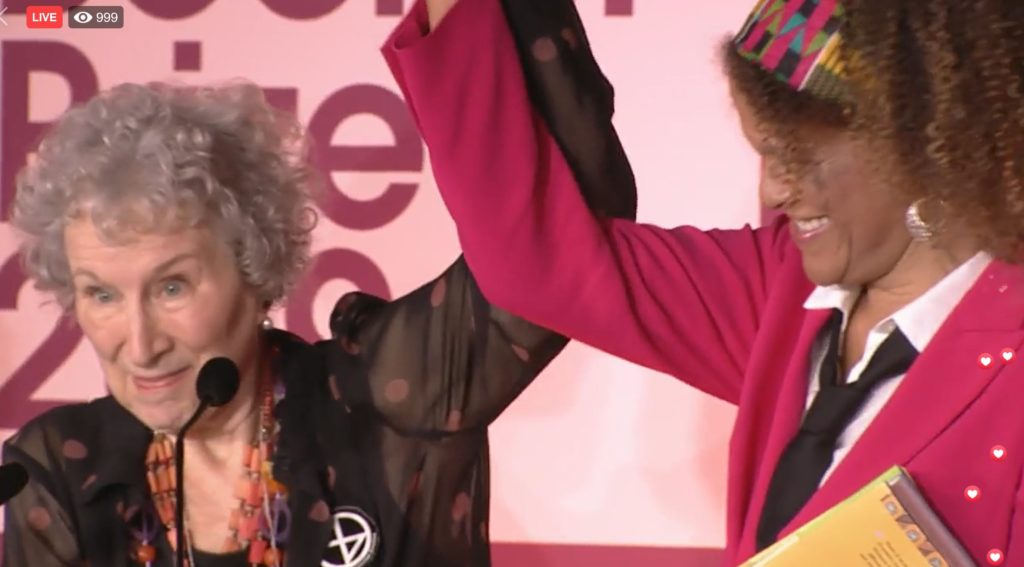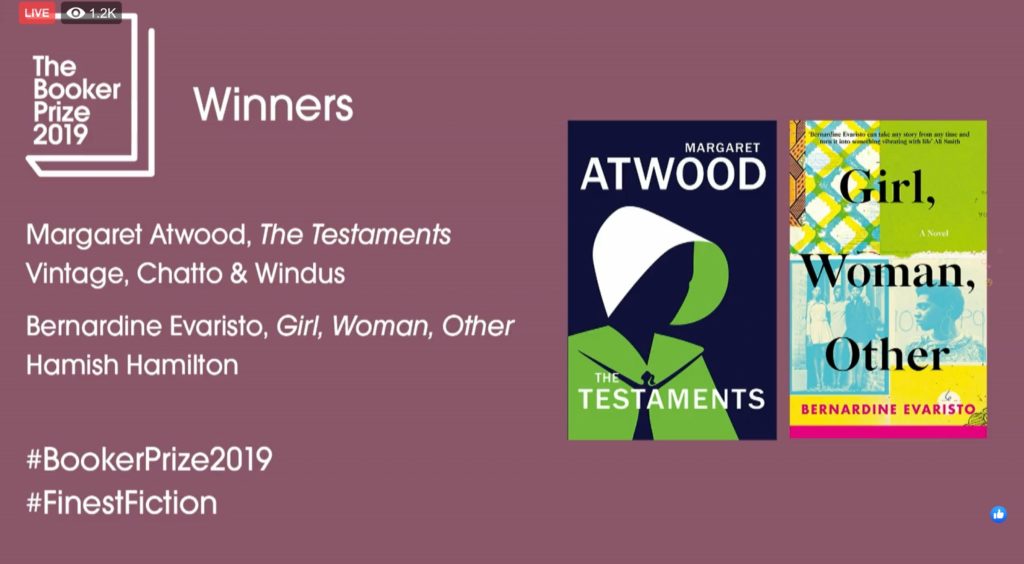
The judges of the 2019 Booker Prize for Fiction overturned the rules and awarded the prize jointly to two authors: Margaret Atwood for The Testaments and Bernardine Evaristo for Girl, Woman, Other.
The Booker Prize has been jointly awarded twice before, to Nadine Gordimer and Stanley Middleton in 1974 and to Michael Ondaatje and Barry Unsworth in 1992. In 1993, the rules were changed so that only one author could win the prize. This is the first time since then that two authors have been announced as joint-winners. The 2019 winners will share the £50,000 prize money.

It is the second time that Atwood has won the Booker Prize, having won in 2000 with The Blind Assassin. She has been shortlisted for four further books: The Handmaid’s Tale (1986), Cat’s Eye (1989), Alias Grace (1996) and Oryx and Crake (2003).
Bernardine Evaristo is the first black woman to be awarded the Booker Prize. She wins with Girl, Woman, Other, her eighth book of fiction, which she has written alongside essays, drama and writing for BBC radio. Evaristo drew on aspects of the African diaspora, be it past, present, real of imagined, to inform Girl, Woman, Other.
The New Statesman said of Evaristo that “if you want to understand modern day Britain, this is the writer to read”, and called Girl, Woman, Other “a story for our times.”
Writing on the story behind her book for The Guardian, Evaristo said:
Fiction excavates and reimagines our histories; investigates, disrupts, validates and contextualises our societies and subjectivities; exercises our imaginations through flights of fancy, takes the reader on transformational adventures, and probes and presents our motivations, problems and dramas. What, then, does it mean to not see yourself reflected in your nation’s stories? This has been the ongoing debate of my professional career as a writer stretching back nearly forty years, and we black British women know, that if we don’t write ourselves into literature, no one else will.
The five judges on the Booker Prize panel were: founder and director of Hay Festival Peter Florence (Chair); former fiction publisher and editor Liz Calder; novelist, essayist and filmmaker Xiaolu Guo; writer, broadcaster and former barrister Afua Hirsch; and concert pianist, conductor and composer Joanna MacGregor.
Gaby Wood, Literary Director of the Booker Prize Foundation, said:
Over an agonising five hours, the 2019 Booker Prize judges discussed all of the much-loved books on their shortlist, and found it impossible to single out one winner. They were not so much divided as unwilling to jettison any more when they finally got down to two, and asked if they might split the prize between them. On being told that it was definitively against the rules, the judges held a further discussion and chose to flout them. They left the judging room happy and proud, their twin winners gesturing towards the six they would have wanted, had it been possible to split the prize any further.
The Booker Prize for Fiction is open to writers of any nationality, writing in English and published in the UK or Ireland.
The Booker award winner typically enjoys a big sales boost immediately after the announcement. In the week after Milkman by Anna Burns won the prize, book purchases increased by 880% from 963 in the week prior to the announcement to 9,446 in the week following the announcement, then a further 99% (9,446 to 18,786) the following week. The total number of copies of Milkman sold, across all formats, is currently 546,500.
Atwood reads:
Evaristo reads:
Discover more from File 770
Subscribe to get the latest posts to your email.

I am very satisfied with this decision. Bernadine Evaristo strikes me as exactly the sort of writer who could use the sales and attention boost the Booker gives. The win for Margaret Atwood is more of a lifetime achievement award, though I do like The Testaments. Besides, Ms. Atwood has announced that she will donate her share of the prize money to a charity for indigenous Canadians, which is a lovely thing to do.
I am also happy with the other literary award announcement of the day, since the German Book Prize (Germany’s equivalent to the Booker and National Book Award) went to Saša Stanišic for his autobiographic immigrant novel “Herkunft” (Oriign), breaking the strangehold of middle class family sagas and middle class urban ennui on the award. Mr. Stanišic, who was born in Bosnia and came to Germany as a teenager during the Balkan Wars, promptly used his acceptance speech to criticize Peter Handke’s Nobel Prize win, too.
ETA: WordPress doesn’t recognise one of the diacritics in Stanišic’s name, so I have used the plain letter instead.
I haven’t read either yet. I do enjoy Atwood’s books but I would have thought that The Testaments doesn’t need a Booker. Still, I like the idea of the judges breaking the rules.
I’ve not yet read it, but can’t help thinking the Testaments win is partly because of a sense that The Handmaid’s Tale damn well should have won back in 1986.
I wish more judges broke rules in generosity instead of punitiveness.